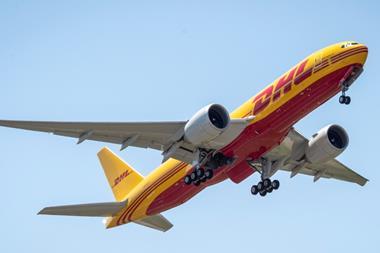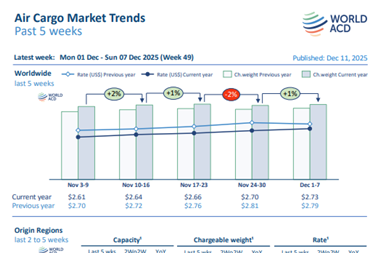
DHL Global Forwarding saw its air cargo volumes and revenues rise in the third quarter led by trades out of Asia but gross profits came under pressure due to rising rates.
The forwarding business registered an 8.5% increase in air cargo volumes to 445,000 tons during the third quarter and revenues improved by 17.2% to €1.6bn.
Meanwhile, gross profits were on the slide and decreased by 15.2% year on year to €235m.
The company said that airfreight gross profits were affected by challenging capacity procurement on specific trade lanes, which would have pushed up the price of buying space on aircraft.
When procurement prices rise, there is usually a lag as it takes time for forwarders to pass the costs onto customers.
DHL added that as a result of the capacity shortages, it had lowered its operating profit expectations for air cargo during the fourth quarter of the year.
The volume improvement was ahead of that of the current largest air cargo forwarder, Kuehne+Nagel, which last month reported a 6.6% increase.
Meanwhile, the express division saw revenues increase by 3% year on year in the third quarter to €6.1bn and operating profits increased by 2.8% to €686m.
Time Definite International (TDI) volumes were down 5.9% on last year and Time Definite Domestic volumes were up 7.1%.
The overall business saw third-quarter revenues increase by 6.2% year on year to €20.6bn, operating profits were up 0.1% to €1.4bn and net profit was down 6.9% to €751m.
Meanwhile, the company lowered its ebit expectation for the full year to €5.8bn from a previous forecast of €6-6.6bn.
"The Board of Management continues to expect that the Group will benefit from a seasonal increase in B2C shipment volumes until the end of the year," the DHL Group said in a press release.
"However, based on the trading in October, there is currently no indication of a better development for B2B and mail volumes. Also, in the airfreight forwarding business, margins are below expectations despite some seasonal acceleration of volumes."
With profits coming under pressure, the company has been looking to reduce capital expenditure.
"The macroeconomic environment remains very challenging. Germany has slipped back into recession and no significant growth impetus is coming from Europe, either," said chief executive Tobias Meyer.
"Due to our high revenue share in Europe, this affects us more severely than competitors who have grown more significantly in the USA. Of course, we would have liked to have seen an economic boost.
"But in view of the overall situation, our result for the third quarter is in line with expectations. Particularly challenging were the developments in mail volumes and the performance of the air freight forwarding business."
Looking at the peak season, he added: "The final quarter is traditionally the busiest time of the year for DHL Group. We expect a typically positive seasonal business trend. Our primary goal is to deliver the best possible quality for our customers, even in this phase of high shipment volumes.
"Good preparation is particularly important at this time. Express, for example, is using additional Boeing 777 cargo aircraft to serve the important routes between Asia and Europe. Supply Chain plans to deploy almost 500 additional robots and around 5,000 temporary workers.
"At the same time, however, we also want to translate the higher shipment volumes into a positive earning development. Among other measures, we have introduced a demand surcharge for international express shipments. Accordingly, we are optimistic about the peak season."

https://www.aircargonews.net/freight-forwarder/kuehnenagel-predicts-a-muted-air-cargo-peak-season/
https://www.aircargonews.net/1073470.article
https://www.aircargonews.net/business/dhl-group-reveals-new-strategy-to-drive-revenue-growth/















